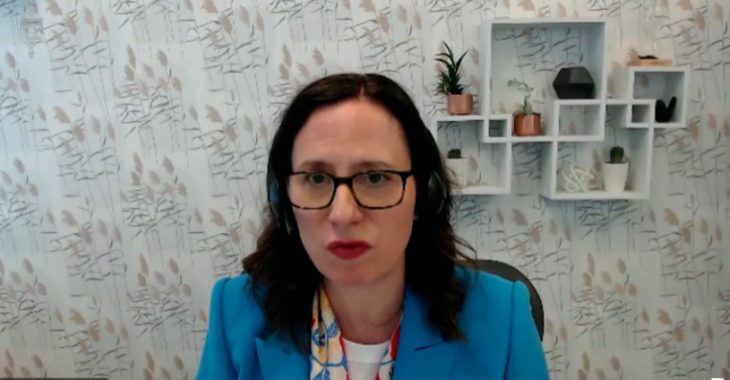
By Christopher Guly
OTTAWA – The head of Google’s Canadian operation was repeatedly pilloried on Friday by members from all parties of the House of Commons standing committee on Canadian Heritage frustrated by her failure to provide the information they sought on the company’s test limiting news for some Canadian users.
While Sabrina Geremia, vice president and country managing director for Google Canada, said the test in response to bill C-18 would end on March 16, she was pressed by Montreal Liberal Member of Parliament Anthony Housefather on whether the company relied on individual user data to block under four per cent of Canadian users – or about 1.2 million Canadians – from accessing news sources.
Rather than providing a yes-or-no answer, Geremia deferred to Jason Kee, the Ottawa-based public policy and government relations counsel for Google, who was not summoned to appear before the committee and who was not asked to reply.
The committee also invited Sundar Pichai, CEO of Google parent Alphabet; Kent Walker, Alphabet’s president of global affairs and chief legal officer; and Richard Gingras, vice president of news at Google – all three of whom declined to appear.
The company began conducting the test in response to the Online News Act, which would require online platforms to compensate news publications for linking to their work. It is currently on second reading in the Senate.
Committee vice chair and Saskatchewan Conservative MP Kevin Waugh asked Geremia why Google didn’t provide Canadians with a heads-up about the 11,500 product tests it conducted, which she said normally don’t come with any public notification.
“You don’t tell Canadians what you’re testing,” he said, demanding a list of what was involved in the tests, which began at the top of the year.
Geremia said the tests were intended to “improve user experience” and determine “drop-off rates.”
In an “open letter to Canadians” Friday, Geremia said the bill “puts a price on free links. When you put a price on linking to certain information, you no longer have a free and open web. Requiring payment based on linking encourages cheap clickbait, not quality journalism.”
“I think Google has over-stepped your boundaries in this country,” Waugh said.
Google was compelled by the committee to provide communications related to actions it planned or was considering taking in relation to the proposed legislation and a list of all news organizations blocked by Google in Canada.
“We got none of that information,” said Housefather, adding it received “a bunch of publicly available information.”
Geremia did not reply to a question as to whether she sent any emails or texts about C-18, but said the committee’s request for the materials “was very broad” and was provided with “very short notice.”
Ontario New Democrat MP Lindsay Mathyssen then asked her when her colleagues could expect to receive that information, and could Geremia not set a deadline for delivery.
“The team is evaluating your request. These things do take time,” she responded. “I can’t speak to their deadlines.”
Mathyssen asked Geremia why Google is “voluntarily engaging in censorship of news content” in response to a bill it claims is engaging in censorship.
“C-18 will radically change the legal landscape for linking in Canada,” she said in response, noting the tests were conducted because of the “uncertainty” surrounding the legislation and “the potential impact” of it on Google.
“I think Google has over-stepped your boundaries in this country,” he said.
Ontario Liberal MP Lisa Hepfner said she was “concerned and disturbed” by Google’s tests, alleging the company is “abusing its dominance” and trying to “strong arm the Canadian government.”
In light of the absence of “fulsome answers from these witnesses,” Hepfner called on her Liberal colleague and committee chair, Hedy Fry, to authorize having Geremia and Kee testify under oath – a rare occurrence in House committee proceedings.
Affirming an oath, however, failed to get Geremia to answer questions posed to her, such as from Mathyssen, who repeatedly asked her about whether the tests were authorized by Google Canada or its parent company – prompting Fry to press the Google Canada boss to reply, but to no avail.
Ontario Liberal MP Chris Bittle, a former civil litigator, called Geremia’s conduct in committee “disgusting.”
“In my seven years, I haven’t seen a witness sworn in mid-testimony because the members of this committee don’t think you’re being truthful, Ms. Geremia,” he said.
“You pretend to not know nothing. If it’s truthful, I think your shareholders would be appalled. You owe it to the Canadian people to answer these questions. You do billions of dollars’ worth of business here.”
Geremia did not answer questions about whether it was okay to block news content to Canadians, nor did she say whether Google would inform Canadians about whether they’ve been impacted by the product tests.
Geremia did, however, provide an answer when asked whether Google would respect bill C-18 should it become law.
“Yes,” she replied.
The Globe and Mail reported Friday that Meta, the parent of Facebook and Instagram, is prepared to block news in Canada on the apps if the bill becomes law.
Screenshot of Sabrina Geremia taken from her House committee appearance Friday.


